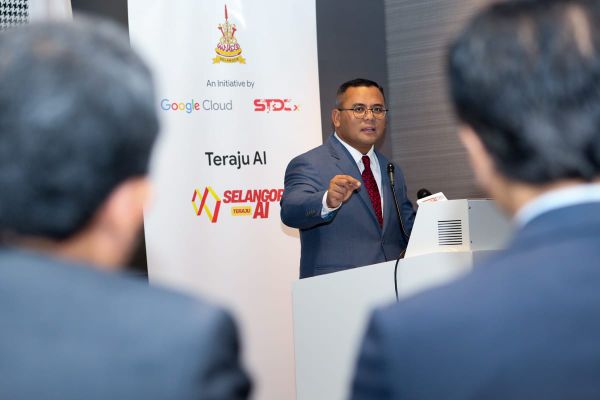By Danial Dzulkifly
SHAH ALAM, May 6 — Selangor's drive to adopt artificial intelligence (AI) in government services is more than just keeping pace with global trends. It is to fundamentally reshape public service delivery, making it faster, leaner, and more responsive to citizens’ needs.
Policy experts say the state's RM5 million Teraju AI initiative, in collaboration with Google Cloud Malaysia, aimed at developing AI-driven solutions, could serve as a scalable model for AI-powered governance, offering significant improvements in administrative efficiency, cost reduction and citizen engagement.
“AI systems can consolidate, verify and disseminate government data in real time. Making accurate, public-facing dashboards accessible can deter corruption, improve citizen trust and reduce misinformation,” said economist Samirul Ariff Othman.
The Global Asia Consulting senior consultant cited the example of an AI-powered interface that tracks local council performance or budget allocations in real time, helping to reduce leakages and strengthen fiscal transparency.
Universiti Teknologi Malaysia (UTM) associate professor Nor Raihana Mohd Ali shared a similar view, explaining that AI enables a shift from reactive to proactive governance.
“AI-driven governance enables the public sector to move from a reactive to a proactive model, allowing the government to intervene at an earlier stage, informed by valuable data,” she said.
[caption id="attachment_343620" align="aligncenter" width="1200"] Image for illustration purposes only. — Picture via PEXELS[/caption]
Image for illustration purposes only. — Picture via PEXELS[/caption]
Faster, more accessible public services
Raihana, who is attached to UTM’s Faculty of Artificial Intelligence, said one of the most immediate impacts in adopting AI in government services will be felt in the public's user experience.
She explained that the shift could significantly reduce visits to government counters and replace complex, paperwork-heavy procedures with digital assistants and mobile platforms, potentially extending services to rural or underserved communities.
“By integrating AI into its administrative backbone, Selangor can not only save on operational costs but also improve strategic planning and policy implementation with greater accuracy and responsiveness,” she added.
Samirul pointed out that automation can also help reduce administrative errors and speed up processes such as permit approvals and procurement.
While acknowledging that AI will reshape the public sector workforce, he stressed that this transition must be guided by sound policy.
“Public trust is the backbone of any digital transformation. If citizens feel their personal data is mishandled or used without consent, it could lead to backlash, non-participation, or even legal challenges.
“Ethical lapses, such as bias in algorithms or opaque decision-making, can have economic consequences, including failed implementations, litigation, or the need to rebuild systems, resulting in sunk costs.
“Establishing clear frameworks on data privacy, algorithmic accountability, and human oversight ensures long-term stability, encourages uptake and enables responsible innovation in public services,” he said.
[caption id="attachment_348399" align="aligncenter" width="1200"] A sign at the World Artificial Intelligence Conference in Shanghai, China, on July 6, 2023. — Picture by REUTERS[/caption]
A sign at the World Artificial Intelligence Conference in Shanghai, China, on July 6, 2023. — Picture by REUTERS[/caption]
Reskilling for an AI-ready workforce
Raihana emphasised the importance of comprehensive reskilling programmes that focus not only on technical proficiency but also on adaptability, critical thinking, and ethical awareness.
“To support this transition, it is crucial for the state to invest in reskilling programmes that prioritise adaptability, ensuring a workforce capable of navigating the evolving demands of AI.
“Public policies should focus on human-centred upskilling that includes not just technical training, but also competencies in digital ethics and human-AI collaboration.
“Creating public-private training alliances, for example, with local universities, tech firms, and civil society, can ensure that reskilling efforts are relevant and future-proof.”
She added that transitional support programmes such as job matching services and micro-credentialing platforms can help workers navigate this evolution with confidence and dignity.
Raihana said Teraju AI also reflects Selangor’s commitment to building not just technological infrastructure but also digital trust.
[caption id="attachment_394655" align="aligncenter" width="1200"] Menteri Besar Dato’ Seri Amirudin Shari speaks at the memorandum of understanding signing ceremony between Google Cloud Malaysia and the Selangor government, through the Selangor Technical Skills and Development Centre, at Google Malaysia, Kuala Lumpur, on March 24, 2025. — Picture by FIKRI YUSOF/MEDIA SELANGOR[/caption]
Menteri Besar Dato’ Seri Amirudin Shari speaks at the memorandum of understanding signing ceremony between Google Cloud Malaysia and the Selangor government, through the Selangor Technical Skills and Development Centre, at Google Malaysia, Kuala Lumpur, on March 24, 2025. — Picture by FIKRI YUSOF/MEDIA SELANGOR[/caption]
The Selangor government officially launched Teraju AI on March 24 in collaboration with Google Cloud Malaysia, marking a three-year commitment to develop AI-driven solutions across state departments.
Menteri Besar Dato’ Seri Amirudin Shari announced that RM5 million has been allocated for the programme’s first phase, involving 11 state entities, including the Selangor State Assembly, in pilot projects.
“At the heart of this initiative is a problem-solving approach, where each department will identify at least one bottleneck and work with Google’s experts to develop a minimum viable product using AI,” he said during the launch.
He added that Teraju AI aims to provide public access to government systems to promote transparency and improve the accuracy of publicly available data.
A Memorandum of Understanding was also signed between Google Cloud and the Selangor Technical Skills Development Centre (STDC) to establish an AI Industry Incubator, which will support startups and small and medium enterprises (SMEs) with learning, development, and scalability resources.
Participants from the 11 agencies who complete the programme will receive Google Cloud certification, while those who do not will be required to bear the full training cost.
The initiative complements efforts by the Federal government, who recently launched its own AI at Work 2.0 programme through the National AI Office, aimed at training 445,000 civil servants in generative AI tools.




